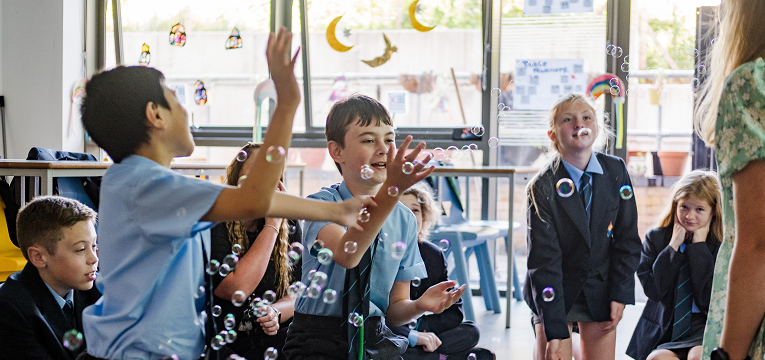An integrated approach to specialist provision

Quick links:
Information about the school
Monmouth Comprehensive School (MCS) is an English-medium 11-18 school maintained by Monmouthshire local authority. It serves the town of Monmouth and the rural areas of Cross Ash, Llandogo, Raglan, Trellech and Usk, with around 27% of students travelling from the border counties of Gloucestershire and Herefordshire. There are 1,693 pupils on roll, of which 316 are in the sixth form. Around 15% of pupils are eligible for free school meals. Nearly all pupils speak English as their first language and come from a white, British background. Very few pupils are fluent in Welsh.
The percentage of pupils with additional learning needs, requiring at least reasonable adjustments is around 19% of the overall school population, including the specialist resource base (SRB). The proportion of pupils who have a statutory plan of additional learning needs (Statement / EHCP / IDP) is 3.9% (including the SRB).
The senior leadership team (SLT) consists of the headteacher, deputy headteacher and five assistant headteachers.
Forty-eight students are placed in the Specialist Resource Base (SRB) across years 7 to 13. The SRB is a local authority additional learning provision which provides for pupils with Autistic Spectrum Condition (ASC), speech, language and communication difficulties, severe learning difficulties and physical and medical difficulties. The SRB is fully integrated into the school community, both in its environment and staffing structure.
The SRB provides an inclusive educational experience for pupils with complex additional learning needs within their local community, providing opportunities to learn with and from their peers. Person-centred practice ensures that nearly all pupils placed within the SRB have appropriate provision, achieve beyond the preconceived expectations and progress to appropriate post-16/18 placements.
Context and background to the effective or innovative practice
The SRB opened in 2017 with two pupils. The provision grew to 48 pupils by September 2022. The objective is to develop an integrated and inclusive provision which enhances existing provision and practice, allowing a person-centred approach to meet the needs of pupils. A senior leadership post was created to develop and implement a shared vision and inclusive provision in the SRB and across the school. The on-going review of the provision, resourcing and the needs of changing cohorts has ensured continual refinement, with inclusion and integration central in its development.
Description of nature of strategy or activity
Vision
A whole-school INSET was used to explore the meaning of inclusion for the school, considering existing and evidence-based practice at the school and elsewhere. Case studies were developed around existing practice for mainstream pupils with additional learning needs (ALN), ASD and Down’s Syndrome. At the heart of the agreed vision is that all pupils learn best with and from their peers.
Integration in the School
The SRB is led by an assistant headteacher alongside a lead teacher. Whole school policies inform the systems and practices in place, with adjustments as needed. The school curriculum plan and daily timings are followed with full access to the school environment. A pupil representative from the SRB sits on each Year Council.
Person-Centred Practice
Person-centred practice allows the development of provision to meet individual needs. The majority of pupils attend a mainstream form group and elements of mainstream learning, such as technology, expressive arts and PE lessons, supported by SRB teaching assistants (TA). These pupils also attend extra-curricular clubs and activities, alongside mainstream peers. SRB pupils take an active role in school productions and carol services. Reasonable adjustments include TA support and upskilling mainstream staff. Post-16 provision includes work experience placements in the local community and the school.
Dosbarth Enfys
During the 2022-2023 academic year, Dosbarth Enfys was developed to provide for pupils with more complex ALN in Years 7 and 8, who are unable to access any elements of mainstream provision. However, these pupils access all communal areas and specialist facilities within the SRB. This is an area of continued development due to changing needs, with an increase in appropriately trained staff and on-going refinement of multi-sensory learning and communication approaches.
What impact has this work had on provision and learners’ standards?
Staff in the SRB include primary and secondary trained teachers, as well as those with specialist qualifications or experience in ALN. Staff disseminate best practice to develop consistency in the SRB and across mainstream curriculum areas.
The development of a broad and balanced person-centred curriculum leads to high levels of engagement and progress within the SRB and when pupils access mainstream lessons. Pupils develop independence and resilience. They interact successfully with mainstream peers in a range of situations. Access to extra-curricular activities has extended their experiences and increased positive relationships. Post-16 work experience placements lead to significant improvements in pupils’ communication skills and resilience. Nearly all pupils achieve appropriate qualifications to progress to appropriate post-16/18 placements.
SRB pupils have a sense of identity and belonging rooted in being a pupil at Monmouth Comprehensive School, rather than identifying as a member of the SRB.
How have you shared your good practice?
The assistant headteacher worked across south-east Wales during a secondment focused on the implementation of the Additional Learning Needs and Education Tribunal (ALNET) Act. Both the assistant headteacher and the lead teacher for the SRB contribute to regular network meetings with the local authority (LA) SRB Team. These meetings inform the development of SRB provision across the LA. The assistant headteacher leads ALN co-ordinator meetings with partner primary schools to refine inclusive approaches to ALN.